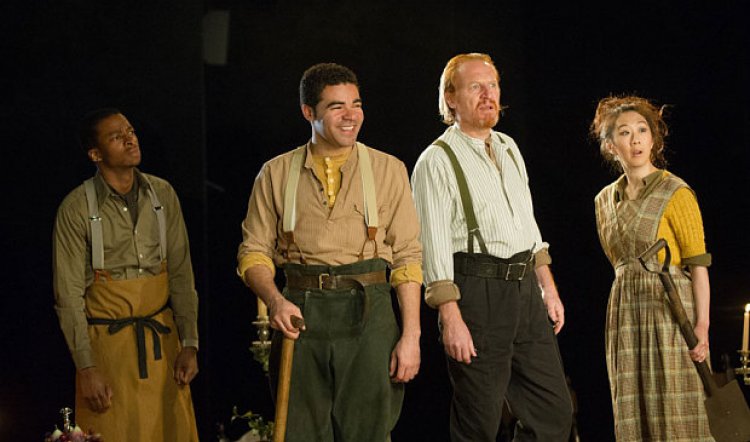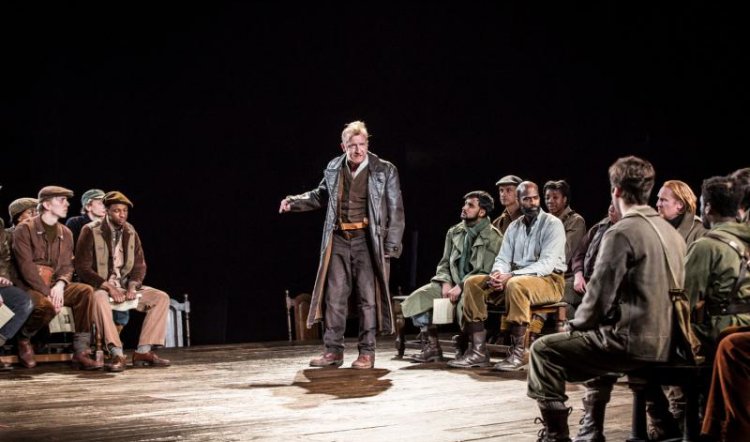
LIGHT SHINING IN BUCKINGHAMSHIRE
LIGHT SHINING IN BUCKINGHAMSHIRE, Lyttelton Theatre at the National Theatre Company, Southbank; April 24-June 22 2105.
When this play was first staged in 1976 through Joint Stock Theatre Company it was somewhat overshadowed by the appearance, the same year, of Vinegar Tom, a work that explored similar themes and styles but which also fired the public imagination. Yet in choosing to revive Light Shining on Buckinghamshire, in the lead up to the general election on May 8 the National Theatre’s new director Rufus Norris tells us something, intentionally or otherwise, about politics then and now.
This particular classic of Caryl Churchill agitprop is politics and history to its core. Set in the aftermath of the civil war that cost Charles I his head, it explores in depth and – occasionally – verbatim the arguments and beliefs of the Ranters, the Diggers and the Levellers. These were the people whose hopes and dreams had been galvanised by the removal of the king and his upper crust, only to find a fresh layer of oppression bearing down through the inevitable new elite. It was ever thus and, looking at governments and states around the world, the irony is bitter as ever.
This production of the play is rendered visually epic by director Lyndsey Turner. She has turned the original cast of six into 60 with 40 members of a community theatre company augmenting 19 professionals in the speaking roles. The numbers – sometimes choreographed in groups and tableaux having the look of a funky Rembrandt (lighting Bruno Poet) – are accommodated and displayed on a spectacular set by Es Devlin. It starts out as a massive table loaded with the extravagant food stuffs and dining accoutrements of Charles’ court. It’s ceremoniously cleared to become a rough timber floored meeting place where the Putney Debates of 1647 occur.
The thick and often impenetrable mulch of contemporary language is illuminated at this point when the Leveller colonel Rainborough cuts through the brown noise with his exhortation, “The poorest he that is in England has a life to live as the greatest he. And therefore truly sir, I think it clear that every man that is to live under a government ought first by his own consent to put himself under that government.” A good idea still awaiting implementation.
Mulch comes into its own in the second act when the Diggers set to with their shovels and the floor timbers are ritualistically removed to reveal acres of rich soil. This is St George’s Hill in Surrey, and the radicals demonstrate that Marx was not the first to decide that collectively owned and worked land might feed the starving and definitely be better used than by absentee owners. But, of course, revolutions being what they are, the circle turned its fullness and Cromwell became a pillar of the status quo and a colonial despot – in Ireland.

Liberty, equality, property (for men) and the much anticipated second coming of Christ turned out to be pipe dreams and, in the end, a ragged crew sit around a brazier wondering what went wrong. Clad in a rich array of grubby-chic and quasi-military style (costumes Soutra Gilmour), they are a sad and only too familiar sight. Only when, at the play’s beginning and at moments throughout, they sing in glorious harmony and power (music Helen Chadwick) is there a sense of the possibility of hopes and ideals becoming reality.
Nevertheless, Light Shining in Buckinghamshire is a dour and difficult play, unless you’re familiar with the history, and even then it’s a slog. The problem with real life and most historical documents and transcripts is that drama isn’t the first intent of the makers. That’s where playwrights can be helpful in taking the raw material and turning it into – sorry, sacrilege coming up – entertainment. The production is marvellous to look at and the actors, when allowed, are compelling. For instance, Ashley McGuire as a vagrant woman, Sargon Yelda as Rainborough, Steffan Rhodri as a butcher who chastises the rich (and the comfortable audience) for scoffing meat as children go hungry; and a wide- and wild-eyed youth (Joshua James) whose ecstasy of spiritual uplift is echoed in the self righteous lunacy of present day religious extremism.
In the end, however, despite the spectacle and extraordinary talent that’s evidently gone into the production, it’s mostly worthy and dull rather than thrilling and thought-provoking. In the present context of the UK’s fractured political landscape it has something to say, perhaps, oblique though it might be. Going back to the beginning however, and staging this play rather than the ferociously feminist Vinegar Tom (if you’re going to “do a Churchill”) suggests the thinking hasn’t progressed all that much since 1976.
Personally, I’d like to see Turner and Devlin revisit 1990’s Mad Forest – or to give its full and self explanatory title, Mad Forest: A Play from Romania. It has all the ingredients and possibilities of Buckinghamshire yet few if any of its textual longueurs. Set in Romania just before the revolution it thrills and chills in its examination of the events of Christmas 1989 that led to the downfall of the vile Nicolai Ceaucescu. But perhaps optimism and feminism, no matter how tenuous, aren’t yet acceptable.



